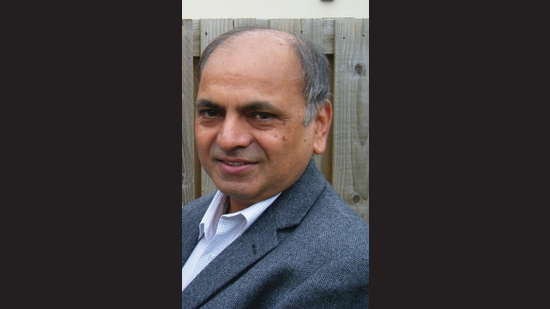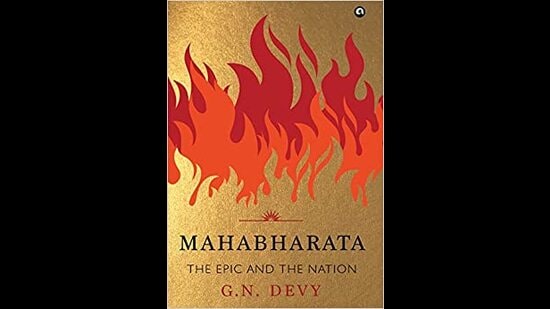Review: Mahabharata: The Epic and the Nation by GN Devy
No other text has survived the many historical vicissitudes of Indian civilization as the Mahabharata has done. The epic story has overshadowed all other forms of human expression, and remained a product of extraordinary cultural significance. In a nutshell, it is an unending story of five generations culminating in a war fought over 18 days. With dramatic twists and mythical turns in the narrative, the epic has never ceased to excite its audiences and viewers. And yet, it is considered inauspicious to keep the text at home while the Gita, its quintessential essence, has remained a spiritual text with a rich philosophical tradition. Though the characters and the events of the epic are frozen in a distant past, the narrative continues to be relevant. What makes the Mahabharata an epic of timeless magic? And what accounts for its continuing influence on the psyche of millions of Indians?
The epic is so crafted that actions by its many heroes, who are victims of their own fallible logic, help spectators identify with its characters as a means of their own catharsis. This lends it an incredible appeal. Perhaps, it is the matter-of-fact manner of writing that captures the timelessness of the political and philosophical aspects presented in the text. With myths still in circulation around us, the Mahabharata appeals as it substantiates their presence in fulfilling our collective desires and gives shape to our anxieties and fears. On top of all this, the epic is also infused with the human emotions of heroism, courage, tension, tragedy, deceit, fantasy, and jealousy that appeal to audiences across generations.
Known for his linguistic and literary scholarship, GN Devy’s meditation on the Mahabharata explores its presence amongst the world’s great literary works, the metaphysical and theological tussles it had to endure, and its political message on warfare and nation building. Taking the reader through the epochal journey in the making of the epic, Devy attempts to make the reader understand why it has survived for so long. Through its characters and subplots, the author argues that the epic presents a palatable potpourri of the historical, mythical, spiritual and psychological perspectives of Time. As a result, the epic ends up being a narrative in subjective reality of the past that is open to multiple interpretations in the present. While several commentaries of the epic already exist, many more are in the making as well.
It is arduous to pinpoint a predominant reason for why the epic has endured across millennia. For some, it is a religious text that helps draw distinctions between right and wrong. For others, the story provides tenets of being on the side of justice. For still others, the Mahabharata offers lessons on what the desire for power does to us. In all these and other readings of the text, it becomes clear that the Mahabharata is what the reader imagines it to be and the freedom to view the characters through a moral lens rests ultimately with him or her.
Devy provides a multi-layered assessment on the epic. He believes the Indian people do not regard the Mahabharata as a work of the past because it brings to them a distinct method of perceiving that past. While one may agree and accept that it takes us through the transition from a pastoral state structure to the early feudal one, how is a war justified in preserving and promoting the ritualistic dharma codified by religious traditions? Did it not focus on warfare, military tactics, and political manoeuvring to depict the character of its actors?

In many ways, the essential messages of the epic have continued to be all pervasive. Indeed, some of them, like the glorification of dharma and the defence of the varna system, have had a deleterious impact on Indian society.
Though somewhat convoluted for the uninitiated, Mahabharata; The Epic and the Nation offers a comprehensive reading of the saga, its evolution and its journey until the present. GN Devy has written a ready reckoner on the subject, which has the potential to trigger a relook at the text. This could also lead to an examination of the many contemporary concerns on which the Mahabharata has a direct bearing. This commentary is a handy and readable addition to the many writings on an eternally relevant epic.
Sudhirendar Sharma is an independent writer, researcher and academic.
No other text has survived the many historical vicissitudes of Indian civilization as the Mahabharata has done. The epic story has overshadowed all other forms of human expression, and remained a product of extraordinary cultural significance. In a nutshell, it is an unending story of five generations culminating in a war fought over 18 days. With dramatic twists and mythical turns in the narrative, the epic has never ceased to excite its audiences and viewers. And yet, it is considered inauspicious to keep the text at home while the Gita, its quintessential essence, has remained a spiritual text with a rich philosophical tradition. Though the characters and the events of the epic are frozen in a distant past, the narrative continues to be relevant. What makes the Mahabharata an epic of timeless magic? And what accounts for its continuing influence on the psyche of millions of Indians?

The epic is so crafted that actions by its many heroes, who are victims of their own fallible logic, help spectators identify with its characters as a means of their own catharsis. This lends it an incredible appeal. Perhaps, it is the matter-of-fact manner of writing that captures the timelessness of the political and philosophical aspects presented in the text. With myths still in circulation around us, the Mahabharata appeals as it substantiates their presence in fulfilling our collective desires and gives shape to our anxieties and fears. On top of all this, the epic is also infused with the human emotions of heroism, courage, tension, tragedy, deceit, fantasy, and jealousy that appeal to audiences across generations.
Known for his linguistic and literary scholarship, GN Devy’s meditation on the Mahabharata explores its presence amongst the world’s great literary works, the metaphysical and theological tussles it had to endure, and its political message on warfare and nation building. Taking the reader through the epochal journey in the making of the epic, Devy attempts to make the reader understand why it has survived for so long. Through its characters and subplots, the author argues that the epic presents a palatable potpourri of the historical, mythical, spiritual and psychological perspectives of Time. As a result, the epic ends up being a narrative in subjective reality of the past that is open to multiple interpretations in the present. While several commentaries of the epic already exist, many more are in the making as well.
It is arduous to pinpoint a predominant reason for why the epic has endured across millennia. For some, it is a religious text that helps draw distinctions between right and wrong. For others, the story provides tenets of being on the side of justice. For still others, the Mahabharata offers lessons on what the desire for power does to us. In all these and other readings of the text, it becomes clear that the Mahabharata is what the reader imagines it to be and the freedom to view the characters through a moral lens rests ultimately with him or her.
Devy provides a multi-layered assessment on the epic. He believes the Indian people do not regard the Mahabharata as a work of the past because it brings to them a distinct method of perceiving that past. While one may agree and accept that it takes us through the transition from a pastoral state structure to the early feudal one, how is a war justified in preserving and promoting the ritualistic dharma codified by religious traditions? Did it not focus on warfare, military tactics, and political manoeuvring to depict the character of its actors?

In many ways, the essential messages of the epic have continued to be all pervasive. Indeed, some of them, like the glorification of dharma and the defence of the varna system, have had a deleterious impact on Indian society.
Though somewhat convoluted for the uninitiated, Mahabharata; The Epic and the Nation offers a comprehensive reading of the saga, its evolution and its journey until the present. GN Devy has written a ready reckoner on the subject, which has the potential to trigger a relook at the text. This could also lead to an examination of the many contemporary concerns on which the Mahabharata has a direct bearing. This commentary is a handy and readable addition to the many writings on an eternally relevant epic.
Sudhirendar Sharma is an independent writer, researcher and academic.
